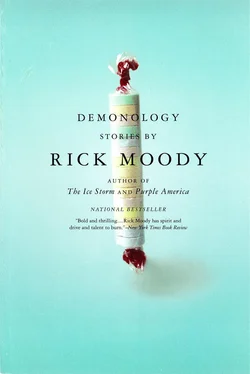The block was empty, the block on Madison between Fifth and Sixth, a block of mostly industrial buildings, loading docks that no longer loaded. The box of sodas she carried, in a variety of types and brands, was overwhelming, and she could see, though her sunglasses were sliding down her nose and neither elbow nor finger was available to restore them to the perfect bridge of her nose, that, up ahead, one of the dogs was indeed on the step, as there was always one. But which? And why couldn’t security be routine in the matter of where you had your stereo and your jewelry and your paperbacks and your inherited lamps? Closer now, she could almost make out, it was either the lab-and-shepherd mix or it was the shepherd-and-lab mix and was it the one that was going to take a hunk out of her unprotected calf, so that she would never dance again and would have a hideous and disfiguring scar. Like that night when she was a little drunk and was first bringing home her boyfriend, okay more than a little drunk, absolutely dyslexic with surfeit of drinks, and they were coming up the step and she had said to him, Nevermind about the dogs, and then the dog had begun to growl, on the crumbling step of the landing, and then when she tried gamely to overleap the dog, as though stepping over the dog were to step across the nuptial threshold, the dog had nipped at her. She’d felt a dis turbance of air. She’d jumped. She was known for her ability to jump, to perform the entrechat and the grand jet, and this was therefore a professional jump. The dog didn’t make contact, understand, but nipped at her, and then her boyfriend-to-be yelled at the dog and waved his arms until it skulked down the steps and waited, for a time, in the empty expanse of Madison Street. Growling. Yes, she was certain of it, it was that dog with the shepherd in it, as opposed to the dog with lab in it, an unbalanced dog, a dog from some deep troubled realm of doghood that didn’t recognize that it was a companion species or had a history of protecting and admiring humans; it was part timber wolf, and it intended to bite clean through her Achilles’ tendon and to disable her; it had unlearned its domestication. There was a desperation to its movements, when it moved, a desperation of the sort that animal psychologists refer to as liberty hysteria. It would run up and down the street, this way and that, unknowing, anxious, deprived of the strategic constraint of home.
Naturally, as she began to mount the three steps that ascended to the entrance of her building, carrying a cardboard box full of twelve bottles of soft drinks in a variety of brands, the dog began to growl again. And the street was empty, and she was alone, and she had this party to prepare for tonight. That was it, see, there was a party, in less than an hour and a half, she was a busy woman, and didn’t have time for this dog on the step, and she was a little panicked, if also resolute, and somehow the dog sensed this (they can smell the fear), and began to become agitated, at first growling quietly, but then barking continuously, and the two of them, she and the dog, fell into a mutual refusal to yield, a refusal to go forward, she wouldn’t go forward up the step, she was afraid, the dog wouldn’t budge either, wouldn’t attempt its violence, but wouldn’t move. They stared at one another in this way, the dog bared its rotting smile; she attempted to refix her grip on the cheap, corrugated cardboard box that housed the sodas (an ineffectual box that the discount-beer-and-soda place had given her). Then after one of those prolonged cinematic intervals that had much to do with the flood of relevant chemicals into the viaducts of the circulatory system, a prolonged cinematic instant that involved recollections of the German shepherd that lived up the street in Wilton, the stray lunged and the cardboard box gave out, as she instantly recognized it was designed to do, and there were bottles rolling, into the street; this way a pair of Diet Cokes; in another direction, some tonic water; there a lone bottle of orange soda that she shouldn’t have bothered to purchase. Who drank orange soda? She tumbled, fell backward, down the two steps, onto her butt, gouged a big hole in her black nylons, smudged her miniskirt with soot, and the dog lingered on the edge of the top step, fierce, insistent, in full possession.
The sun declined under the ridge adjacent, upon which sat Union City, abruptly rendering the facades of Madison Street in umbral gloom. Bottles of soda continued to hasten away. A gray Honda Civic ran over one of the Diet Cokes with the pop of a cheap firearm. She began in the most forceful language to admonish the hound, You stupid dog, I have things to do, okay? Beat it! which antagonist continued to bark anyhow. Remember the dog that your neighbor had that one summer when you rented a house on the Jersey Shore or on the Cape or in Southampton, the neighbor who rarely went outside except to remonstrate with his kids and to turn the sprinkler on his desertified lawn? Remember his rottweiler, that miserable rottweiler, in the spattered cage out by the garbage cans, who, when his owner went to the local watering holes, would bark, at painfully unpredictable intervals, four or five hours at a clip, a mournful, desperate barking? If you tried to rectify the barking, with a couple of dog biscuits or a bowl of Kal-Kan, you would find his lonesomeness was nothing compared to his desire to devour all intruders or passersby and therefore yourself? This scene was like that.
She blushed. She summoned her bravest and most firm voice, low in the register, Get out of here, come on, really, go to the meats department at C-town, or something, I don’t have time. Some resolve of her youth had given out and she felt suddenly helpless. The dog refused to yield. She was getting ready to hit him with her handbag, which had not a single blunt object in it (Anna Karenina, a plastic twelve-ounce bottle of water, three lipsticks, a wallet, a holder for tampons, a hairbrush, several varieties of breath mints, two ballpoint pens, an address book, a spiral-bound notebook), but which nonetheless would be useful as a device for a throttling, though maybe she could also use several bottles of soda as missiles, which, under compression of carbonation, would scare the hell out of the dog. But before she could effect the plan, the two additional dogs swung wide around the corner of Madison and Sixth, sprinting according to their liberty hysteria, following a navigational sense invisible to homo sapiens sapiens; they soon fell into position at her crumbling step. Maybe they had been intent upon another destination. Not now. It was a territorial thing. The three were assembled, the stray dogs of her neighborhood, all in disputation, each wanting ascendance of her step, its view, its majesty. One of the two at the bottom of the step leaped at the shepherd-and-lab mix, it was the mutt, and they fell into a real commotion. Somebody’s neck was going to be perforated. So aggravated was the altercation that a neighbor was moved to lean out a window across the street, to complain,
— What’s the idea? We got a business here. We can’t work with that racket going on. Give it a rest.
— Then give me a hand, she called in reply. — Or they’ll be at it all day and all night and they’ll drive us all crazy.
The window slid shut.
— At least call the police, she said. — Or the fire department. Or whoever it is you call when you’re trapped in a stray-dog dispute. I mean, come on.
She added dulcetly:
— You asshole.
The window, designed and constructed in an era when manufacturing industries still had windows, when offices had windows, when window meant access to fresh, unrecirculated air, as opposed to double-thick water-retardant panes that insurance corporations will not allow open lest some employee should have the good sense to plunge to his or her final end, landing on the roof of an El Dorado, bouncing to the left, crushing a gifted young Slovakian flutist making her first visit to the United States, the window slid up, and the aforementioned small business owner, of Hobo-ken Tool and Die Corporation, again leaned out.
Читать дальше












